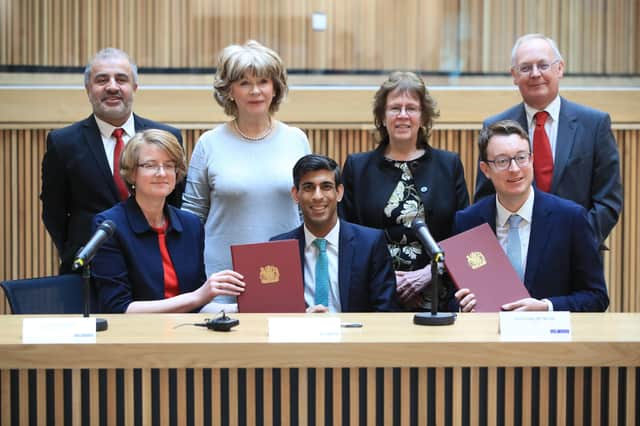What West Yorkshire devolution deal can deliver - The Yorkshire Post says


The accomplishment has given West Yorkshire the powers and pounds it needs to start fulfilling the region’s potential and improve the lives and prospects of everyone who lives in the area.
The agreement, which will see the economic development of Leeds, Bradford, Calderdale, Kirklees and Wakefield overseen by a new elected mayor from next year, is also a key step forwards in the Government’s ‘levelling up’ promise to reduce the economic divide between the North and London.
Advertisement
Hide AdAdvertisement
Hide AdThe new mayor will have control of adult education, given new decision-making powers and access to a new West Yorkshire Investment Fund worth a guaranteed £1.1bn over the next 30 years. Less tangibly but equally importantly, they can raise the profile of the region and its investment opportunities as its public face in the way the likes of Andy Burnham and Andy Street have done in Greater Manchester and the West Midlands respectively.
Of course, with the new powers and spending comes extra responsibility and readers can rest assured that The Yorkshire Post will hold leaders in charge of vast sums of public money to account for the way in which it is spent and what that delivers.
Equally, the fine print of the deal continues to offer hope for those who back the idea of a wider Yorkshire devolution deal in time. The new agreement includes a Government commitment to provide £200,000 to fund the work of a Yorkshire Leaders Board, an organisation which would tackle pan-regional issues such as Brexit, the climate emergency and the visitor economy. If that proves to be a success, it will offer further evidence of what Yorkshire can collectively achieve when operating as a single entity.
This newspaper remains convinced that in a post-Brexit, global world when it comes to making regional voices heard, bigger is better and the Yorkshire brand is recognised and cherished not only in this country but around the world.
Advertisement
Hide AdAdvertisement
Hide AdThat is a view shared by the communities in Doncaster and Barnsley who voted decisively in favour of a One Yorkshire deal to best represent their interests in 2017 – with the current Sheffield City Region arrangement they are involved in allowing them to pursue that ambition in future.
Such an agreement would of course have its own challenges, not least from ensuring that the interests of each area of Yorkshire were fairly represented. But a perfect example of how such challenges can be met is found in the West Yorkshire devolution deal – a name agreed after concerns were raised in Wakefield that they did not wish to be part of a ‘Leeds City Region’ deal. It is not just a symbolic move – it will be a reminder to whoever becomes the new mayor next year that extra pounds and powers will be properly shared out between the local authority areas involved.
The political manoeuvring to become the new mayor of West Yorkshire is already under way and the post will be much sought-after. But whoever is elected next year must remember that to fulfil West Yorkshire’s potential, party political concerns must be secondary to serving the two million people they represent.
Whatever the future holds, this should be a moment of celebration. West Yorkshire now has the power to shape its own destiny rather than relying on Whitehall.